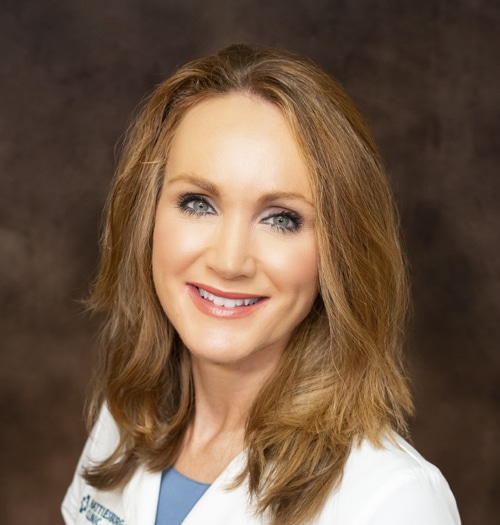What is an Obstetrician and When Should You See One?
Pregnancy is a life-changing event that can bring about happiness and anticipation, but it also comes with physical, medical and emotional challenges. During pregnancy, it is essential to have the support and guidance of a health care professional who specializes in pregnancy, labor and childbirth to help navigate these challenges.
Lauren E. Barry, MD, a physician with Hattiesburg Clinic Obstetrics & Gynecology, offered some insight into what an obstetrician does and why it’s important to have one when you choose to start a family.
What is Obstetrics?
Obstetrics is a field of study within medicine focused on pregnant women, unborn babies, and postpartum care. Obstetrics encompasses a broad spectrum of services aimed at monitoring and managing the health of both the mother and the baby. The field combines medical science, surgery and preventive care to ensure a safe and healthy pregnancy and childbirth experience.
An obstetrician is a medical doctor trained in the field of obstetrics. These highly trained professionals are experts in managing pregnancy, childbirth and the postpartum period. They possess in-depth knowledge of reproductive health, fetal development and maternal well-being.
According to Dr. Barry, your obstetrician can make sure that your reproductive health is optimized and can keep an eye on any concerns or symptoms that may arise.
“As a woman, an Ob-Gyn serves as a partner in the maintenance and monitoring of your overall health, no matter your age,” Barry said. “We can help with proper education and provide a great opportunity to ask questions on any topics related to your reproductive health. “
When Should I See an Obstetrician?
Obstetricians aid in all areas of reproductive health and family planning.
“We can help you prepare for a healthy pregnancy, treat anyone struggling with infertility, or help those who are not looking to start a family by ensuring that you understand all options for proper contraception,” Barry said.
For women who choose to start a family, if routine preconception care has not already begun under the care of an obstetrician, then care should be sought as pregnancy is suspected or has been confirmed with an at-home pregnancy test.
Prenatal Care
One of the primary responsibilities of an obstetrician is to provide comprehensive prenatal care. This care typically begins as soon as a woman becomes pregnant and continues throughout the pregnancy. The obstetrician will first confirm the pregnancy, estimate a due date and initiate prenatal care. They will also provide guidance on nutrition, exercise and prenatal vitamins.
During the course of the pregnancy, they monitor the health and well-being of both the mother and the developing fetus. This includes regular check-ups, ultrasounds and various tests to detect any potential issues or complications early on.
Barry stated that these tests and screenings are essential to a successful pregnancy.
“By detecting anomalies prenatally, we can help you better plan for the birth of your child,” she said. “We are here to help answer questions you may have and guide you toward the best possible outcome for you and your baby.”
As the pregnancy progresses, obstetricians ensure that the baby is developing properly and that the mother’s health is stable. They keep a close eye on factors such as the mother’s weight, blood pressure and any signs of gestational diabetes or preeclampsia.
High Risk Pregnancies
Not all pregnancies go smoothly. Some pregnancies may be considered high-risk due to factors like maternal age, multiple pregnancies (twins or more), chronic medical conditions, fetal abnormalities or previous pregnancy problems. These factors increase the chances of complications during pregnancy that affect the mother, fetus or both. Obstetricians are trained to manage such cases and provide specialized care to minimize risks and ensure the best possible outcome for both mother and child.
In some cases, the obstetrician will work with a maternal fetal medicine specialist to coordinate care. Maternal fetal medicine (MFM) is a subspecialty of obstetrics that focuses on the management of high-risk pregnancies. MFM specialists use advanced tools, such as ultrasound, amniocentesis and genetic testing, to assess the health of the fetus and the mother. They evaluate risk factors associated with the pregnancy and develop tailored care plans to address potential complications. MFM specialists can identify potential complications early in the pregnancy, allowing for timely interventions and a better chance of positive outcomes.
Labor and Delivery
Obstetricians work closely with a team of healthcare professionals, including nurses and anesthesiologists, to provide comprehensive care during labor and delivery. They are on hand to monitor the progress of labor by assessing the mother’s vital signs, fetal heart rate and uterine contractions and equipped to make informed decisions if medical intervention is necessary.
Barry noted that obstetricians play an active role in every stage of the labor and delivery process.
“We are there to help monitor your labor progress and ensure that labor is proceeding safely,” she said. “We are there to assist in delivery of your child, and we are there to perform a cesarean delivery if this is deemed medically necessary.”
Obstetricians are also experts in managing any complications that may arise during labor and delivery, including fetal distress, breech delivery, umbilical cord issues or excessive bleeding.
After delivery, obstetricians continue to provide care to the mother by ensuring that she delivers the placenta, evaluating any tearing and checking for signs of postpartum hemorrhage. They also conduct a physical examination of the newborn, ensuring that the baby is breathing and in stable condition.
Postpartum Care
Postpartum care extends beyond the initial weeks following childbirth. Mothers should continue to see their obstetricians for regular check-ups and health maintenance throughout the postpartum period to ensure they are recovering properly. Obstetricians address postpartum concerns, such as healing after childbirth, breastfeeding challenges and emotional well-being. They are also are trained to identify and manage any postpartum complications that may arise, such as excessive bleeding, infections or blood pressure issues.
“We are here to make sure your body is healing and responding appropriately after pregnancy,” Barry said. “We are also here to make sure your mental wellbeing is optimized in order to care for your new baby. “
Hattiesburg Clinic Obstetrics & Gynecology offers comprehensive pregnancy and delivery services with patient-centered care. Our specialists work with women to provide care for their families from pre-pregnancy through delivery as well as post-partum.
For more information, call (601) 268-5640 or visit www.hattiesburgclinic.com.

